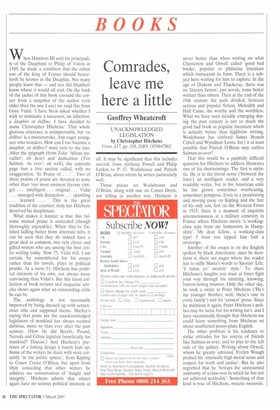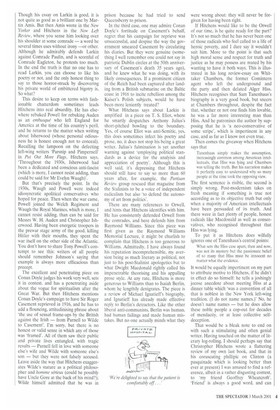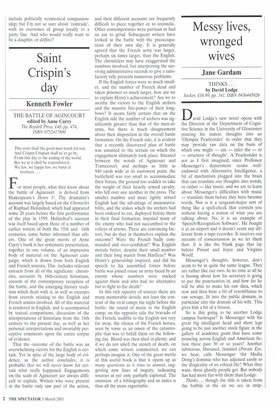Comrades, leave me here a little
Geoffrey VVheatcroft
UNACKNOWLEDGED LEGISLATION by Christopher Hitchens Verso, £17, pp. 358, ISBN 1859847862 When Humbert III sold his principality of the Dauphine to Philip of Valois in 1349, he made a condition that the eldest son of the king of France should henceforth be known as the Dauphin. Not many people knew that — and nor did Humbert know where it would all end. On the back of the jacket of this book (around the corner from a snapshot of the author even older than the one I use) we read this from Gore Vidal: 'I have been asked whether I wish to nominate a successor, an inheritor, a dauphin or delfino. I have decided to name Christopher Hitchens.' That whole glorious utterance is unimprovable, but 'or delfino' is a masterstroke. Any eager youngster who wonders, How can I too become a dauphin, or delfino? must turn to the text. After the epigraph (from Zola: 'Alions tra vailler'; oh dear) and dedication (For Salman. As ever.; oh well), the contents page lists a first section called, with no exaggeration, 'In Praise of . . .' . Two of these psalms of praise are devoted to none other than 'our most eminent literary emigre . . . intelligent . . . original . . . Vidal . . . emerged with distinction . . . sparkling . . . learned . . . . ' This is the great tradition of the courtier; truly has Hitchens deserved his dauphinate.
What makes it funnier is that this fulsome mutual praise is unneeded (though thoroughly enjoyable). When they've finished ladling butter from alternate tubs, it can be seen that they do indeed have a great deal in common, two very clever and gifted writers who are among the best critics writing today. Now 75, Vidal will, I am certain, be remembered for his essays rather than his novels, plays or political pranks. At a mere 51, Hitchens has political interests of his own, not always more convincing than Vidal's, But this latest collection of book reviews and magazine articles shows again what an outstanding critic he can be.
The anthology is not necessarily improved by being dressed up with sententious title and Supposed theme. Shelley's saying that poets are the unacknowledged legislators of mankind has always seemed dubious, more so than ever after the past century. (How far did Brecht, Pound, Neruda and Celine legislate beneficially for mankind? Discuss.) And Hitchens's pretence of a linking design is barely kept up. Some of the writers he deals with were certainly 'in the public sphere', from Kipling to Conor Cruise O'Brien. but apart from shyly conceding that other writers he admires are conservatives of 'insight and integrity', Hitchens admits that others again have no serious political interests at all. It may be significant that this includes several, from Anthony Powell and Philip Larkin to P. G. Wodehouse and Patrick O'Brian, about whom he writes particularly well.
Those pieces on Wodehouse and O'Brian, along with one on Conan Doyle, are telling in another way. Hitchens is never better than when writing on what Chesterton and Orwell called 'good bad books', popular or philistine literature which transcends its form. There is a subject here waiting for him to explore. In the age of Dickens and Thackeray, there was no 'literary fiction', just novels, some better written than others. Then at the end of the 19th century the path divided, between serious and popular fiction, Meredith and Hall Caine, the worthy and the worthless. What we have seen steadily emerging during the past century is not so much the good bad book as popular literature which is actually better than highbrow writing. Wodehouse has outlived James Branch Cabell and Wyndham Lewis. Isn't it at least possible that Patrick O'Brian may outlive SaInnan-as-ever?
That this would be a painfully difficult question for Hitchens to address illustrates one of his shortcomings. The first is stylistic. He is in the literal sense ('between the lines') an intelligent reader, and a very readable writer, but in his American exile he has grown sometimes overbearing, sometimes pompous. Even in a penetrating and moving essay on Kipling and the fate of his only son, lost on the Western Front in 1915, there is a moment of exquisite unconsciousness at a military cemetery in France where Hitchens meets 'a workingclass type from my hometown in Hampshire'. My dear fellow, a working-class type! I trust you tipped him half a sovereign.
Another of the essays is on the English spoken by black Americans; since he mentions it, there are pages where the reader has to stifle Maria's words to Sportin' Life; 'I hates yostruttin' style.' To share Hitchens's insights you must at times fight your way through his strutting, knowing, button-holing manner. Only the other day, he took a swipe at Peter Hitchens my younger brother; well, there's one in every family') and his 'earnest' prose. Since he mentions it again, Peter Hitchens's politics may be lurid, but his writing isn't, and I have occasionally thought that Hitchens ma could learn something from Hitchens mi about unaffected penny-plain English.
The other problem is his tendency to strike attitudes for his coterie of friends like Salman-as-ever, and to play to the left side of the gallery. Writing about Orwell, whom he greatly admired, Evelyn Waugh praised his 'unusually high moral sense and respect for truth and justice'. But he also regretted that he 'betrays the unreasoned animosity of a class-war in which he has not yet achieved neutrality'. Something of that kind is true of Hitchens, mutatis mutandis.
Though his essay on Larkin is good, it is not quite as good as a brilliant one by Martin Amis. But then Amis wrote in the New Yorker and Hitchens in the New Left Review, where you sense him looking over his shoulder at some comrade — a word he several times uses without irony —or other. Although he admirably defends Larkin against Comrade Paulin, and is scornful of Comrade Eagleton, he protests too much. In the end the truth is that no one has to read Larkin, you can choose to like his poetry or not, and the only honest thing to say to those horror-struck by discovering his private world of embittered bigotry is, So what?
This desire to keep on terms with fashionable chatterdom sometimes leads Hitchens into real absurdity, He has elsewhere rebuked Powell for rebuking Auden as an embusque who left England for America at the time of his country's peril, and he returns to the matter when writing about Isherwood (whose personal odiousness he is honest enough not to conceal). Recalling the lampoon on the defecting left-wing writers 'Parsnip and Pimpernell' in Put Out More Flags, Hitchens says, 'Throughout the 1930s, Isherwood had been a dedicated and conscious anti-fascist (which is more, I cannot resist adding, than could be said for Mr Evelyn Waugh)'.
But that's precisely the point. In the 1930s, Waugh and Powell were indeed idiosyncratic apolitical conservatives who hoped for peace. Then when the war came, Powell joined the Welch Regiment and Waugh the Royal Marines, which is more, I cannot resist adding, than can be said for Messrs W. H. Auden and Christopher Isherwood. Having been energetic troopers in the prewar stage army of the good, killing Hitler with their mouths, they spent the war itself on the other side of the Atlantic. You don't have to share Tony Powell's contempt to see this: writers of all people should remember Johnson's saying that example is always more efficacious than precept.
The excellent and penetrating piece on Conan Doyle judges his work very well, sets it in context, and has a penetrating aside about the vogue for spiritualism after the Great War. But then Hitchens mentions Conan Doyle's campaign to have Sir Roger Casement reprieved in 1916, and he has to add a flouncing, attitudinising phrase about 'the use of sexual frame-ups by the British against the Irish — from Parnell to Wilde to Casement'. I'm sorry, but there is no honest or valid sense in which any of those was 'framed'. All of them saw their public and private lives entangled, with tragic results — Parnell fell in love with someone else's wife and Wilde with someone else's son — but they were not falsely accused. Leave aside the way that Hitchens exaggerates Wilde's stature as a political philosopher and homme serieux (could he possibly have Uncle Gore at the back of his mind?); Wilde himself admitted that he was in prison because he had tried to send Queensberry to prison.
In the third case, one may admire Conan Doyle's fortitude on Casement's behalf, regret that his campaign for reprieve was unsuccessful, and despise the way the government smeared Casement by circulating his diaries. But they were genuine (something I well remember one could not say in patriotic Dublin circles at the 50th anniversary of Casement's death 35 years ago), and he knew what he was doing, with its likely consequences. If a prominent citizen of the Reich had been captured after landing from a British submarine on the Baltic coast in 1916 to incite rebellion among the Kaiser's Polish subjects, would he have been more leniently treated?
What Hitchens says about Larkin is amplified in a piece on T. S. Eliot, where he smartly despatches Anthony Julius's short-pitched bowling to the boundary. Yes, of course Eliot was anti-Semitic, yes, this does sometimes infect his poetry and prose, no, it does not stop his being a great writer. Julius's fulmination is yet another warning against 'employing political standards as a device for the analyisis and appreciation of poetry'. Although this is well said, it's depressing that Hitchens should still have to say so more than 60 years after, for example, the Partisan Review group rescued that magazine from the Stalinists to be a voice of independent radicalism but also 'to defend the autonomy of art from politics'.
There are many references to Orwell, and hints that Hitchens identifies with him. He has consistently defended Orwell from the comrades, and here defends him from Raymond Williams. Since this piece was first given as the Raymond Williams Memorial Lecture, it might be churlish to complain that Hitchens is too generous to Williams, Admittedly, I have always found his reputation incomprehensible, my aversion being as much literary as political, not just to his post-Stalinist apologetics but to what Dwight Macdonald rightly called his impenetrable theorising and his appalling prose style. At any rate, Hitchens is more generous to Williams than to Isaiah Berlin, whom he lengthily denigrates. The piece is a review of Michael Ignatieffs biography, and Ignatieff has already made effective reply to Berlin's detractors. Like the other liberal anti-communists, Berlin was human, had human failings and made human mistakes, But no one actually minds what they were wrong about: they will never be forgiven for having been right.
If Hitchens would like to be the Orwell of our time, is he quite ready for the part? It's not so much that he has never been one of those radicals who feel called to a life of heroic poverty, and I dare say it wouldn't suit him. More to the point is that such high moral sense and respect for truth and justice as he may possess are muted by his wanting to have it both ways. This is illustrated in his long review-essay on Whittaker Chambers, the former Comintern agent who left the underground and the party and then delated Alger Hiss. Hitchens recognises that Sam Tanenhaus's biography is a very good book, but sneers at Chambers throughout, despite the fact that, whether or not one finds him lovable, he was a far more interesting man than Hiss. And he patronises the author by supposing that he is 'a neo-conservative of some stripe', which is impertinent in any case, and as far as I know not even true.
Then comes the giveaway when Hitchens says that
Tanenhaus simply makes the assumption, increasingly common among American intellectuals, that Hiss was lying and Chambers was telling the truth. But his narration makes it perfectly easy to understand why so many people at the time took the opposing view.
The first sentence is risible, the second is simply wrong. Post-modernism takes on fresh meaning if something is true not according as to its objective truth but only when a majority of American intellectuals have been persuaded of its truth. And there were in fact plenty of people, honest radicals like Macdonald as well as conservatives, who recognised throughout that Hiss was lying.
To put it as Hitchens does wilfully
ignores one of Tanenhaus's central points: What sets the Hiss case apart, then and now, was not its mystery but the passionate belief of so many that Hiss must be innocent no matter what the evidence.
It would be equally impertinent on my part to attribute motive to Hitchens, if he didn't in effect do so himself: he tells a joshingly jocose anecdote about meeting Hiss at a dinner table which 'was a convention of all that is noblest in the New York left-wing tradition. (I do not name names.)' No, he doesn't name names — but he does allow these noble people a cop-out for decades of mendacity, or at least collective selfdeception.
That would be a bleak note to end on with such a stimulating and often genial writer. Having touched on the matter of literary log-rolling. I should perhaps say that Christopher Hitchens wrote a flattering review of my own last book, and that in his coruscating phillipic on Clinton (a pasquinade which is looking better than ever at present) I was amused to find a reference, albeit in a rather disgusting context, to 'my friend Geoffrey Wheatcroft'. 'Friend' is always a good word, and can
include politically ecumenical companionship; but I'm not so sure about 'comrade', with its overtones of group loyalty to a party line. And who would really want to be a dauphin, or delfino?














































































 Previous page
Previous page